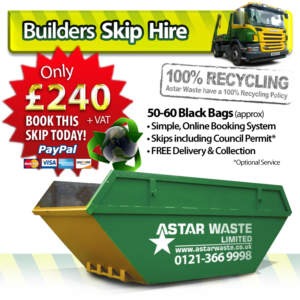Hiring a skip can be an easy and convenient way to remove refuse and debris from your home or business. Skips come in a range of sizes, making them suitable for all kinds of projects, from large scale house clearances or roof renovations to smaller DIY tasks and garden clearouts. If you’re considering the option of skip hire, click here to find out more about what you need to know.
What is Skip Hire?
Skip hire involves renting a large container specifically designed for waste removal. The skip is delivered to a spot on your property where it will remain until you have finished loading it with rubbish and then it will be collected. During this time, you are responsible for ensuring the safety of the skip and its contents.

What Are the Different Types of Skip?
The type of skip you hire will depend on the size of your project. Most skips come in four different sizes – mini, midi, builder and maxi – and each one has a different capacity. Mini skips, for example, are best suited for small clearances whereas maxi skips are suitable for large-scale building projects like home refurbishments and extensions.
How Much Does Skip Hire Cost?
The cost of skip hire can vary depending on factors such as size, duration of hire and location. For example, skip hire costs tend to be higher in bigger cities due to the demand and competition. However, regardless of your region, you can be sure that hiring a skip won’t break the bank. Prices typically start from around £150, but you can get more accurate prices when you get in touch with local skip hire companies.
Do I Need a Permit for Skip Hire?
In some cases, you may need a skip permit before you can hire a skip. These are usually required when you plan to place the skip outside your own property, such as on a public walkway. It is important to check with your local council whether you need a permit – most councils offer permits for free or a nominal fee.
Are There Any Restrictions?
Your skip hire company will provide you with a list of items that can and cannot be placed in the skip. Generally speaking, hazardous materials such as paint, liquids, solvents, medical waste and asbestos must not be put in the skip. It is also important to ensure that the skip is not overloaded, as this can be a hazard and may result in a fine from your local authority.
What Happens to the Waste?
Once your skip has been collected by the skip company, the waste will be taken to a waste processing facility. Here, the rubbish is sorted in order to separate recyclable material. This ensures that the maximum amount of waste is recycled and reused, thus helping to reduce the amount of waste going into landfill.
Whether you’re planning a small DIY project or a major construction, skip hire is a great way to quickly and easily dispose of any rubbish generated. With a wide range of sizes and affordable prices, skip hire is the perfect solution for any household or commercial clearance project.

